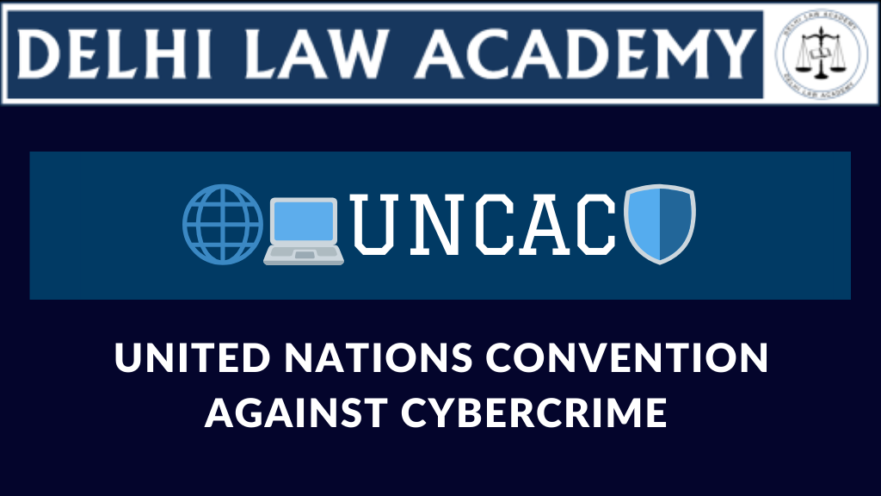
🌐 United Nations Convention Against Cybercrime – Key Features & Global Significance
Delhi Law Academy Jaipur presents below a simplified and structured explanation of the
United Nations Convention Against Cybercrime, recently signed by 72 UN member states.
🌍 About United Nations Convention Against Cybercrime
Recently, 72 of the 193 member states signed the United Nations Convention against Cybercrime in Hanoi, Vietnam.
- Convention was adopted by the General Assembly of the United Nations on 24 December 2024.
- It will enter into force 90 days after the 40th State deposits its ratification.
- The signing process will remain open until 31 December 2026.
- India has not signed the treaty yet.
- UN Office on Drugs and Crime (UNODC) served as secretariat to negotiations.
- It is the first universal legally binding framework for the collection, sharing and use of electronic evidence for all serious offences.
🔐 Key Features of the Convention Against Cybercrime
🔸 Expanded Scope of Cyber Offences
It criminalizes cyber-dependent crimes and also offences related to:
- online fraud
- online child sexual abuse
- non-consensual dissemination of intimate images
🔸 International Cooperation
It establishes a 24/7 network to boost international cooperation.
🔸 Protection of Sovereignty
States Parties shall carry out obligations under this Convention consistent with:
- sovereign equality
- territorial integrity
- non-intervention in domestic affairs
🔸 Victim Support
The Convention encourages States to provide victims with:
- access to recovery services
- compensation
- restitution
- removal of illicit content
Support will be delivered according to each country’s domestic laws.
🔸 Respect for Human Rights
States Parties must ensure implementation of obligations consistent with
international human rights law.
📘 Stay Ahead with Delhi Law Academy!
Get access to free monthly current affairs, read our insightful blogs,
and explore free study resources prepared by experts at DLA Jaipur. 🚀
❓ FAQs on the United Nations Convention Against Cybercrime
🌐 What is the purpose of the UN Convention Against Cybercrime?
The Convention aims to create the first universal, legally binding framework for cooperation, investigation, evidence sharing, and prosecution of serious cyber-enabled crimes across countries.
🕒 When will the Cybercrime Convention come into force?
The Convention will enter into force 90 days after the 40th UN member state deposits its instrument of ratification. The signing window remains open until 31 December 2026.
🇮🇳 Has India signed the UN Cybercrime Convention?
No. As of now, India has not signed the Convention. India continues to evaluate implications for sovereignty, data-sharing obligations, and investigative cooperation mechanisms.
🛡️ What cyber offences are covered under this Convention?
The Convention expands the scope of punishable offences to include cyber-dependent crimes, online fraud, child sexual abuse material, hacking, identity theft, and non-consensual sharing of intimate images.
🤝 How does the Convention improve international cooperation?
It establishes a 24/7 cooperation network for real-time assistance, cross-border evidence-sharing, mutual legal assistance, and coordinated investigation of cybercrimes involving multiple jurisdictions.
⚖️ Does the Convention protect human rights and national sovereignty?
Yes. It explicitly mandates implementation consistent with international human rights law and requires all cooperation to respect sovereign equality, territorial integrity, and non-intervention principles.
Contact us
📍 Delhi Law Academy – Jaipur Branch
6C, Tower 2, Coaching Hub, Pratap Nagar, Jaipur – 302033
📞 Phone:
+91 9911916552
+91 8447285606
✉️ Email:
contactus@delhilawacademy.com

